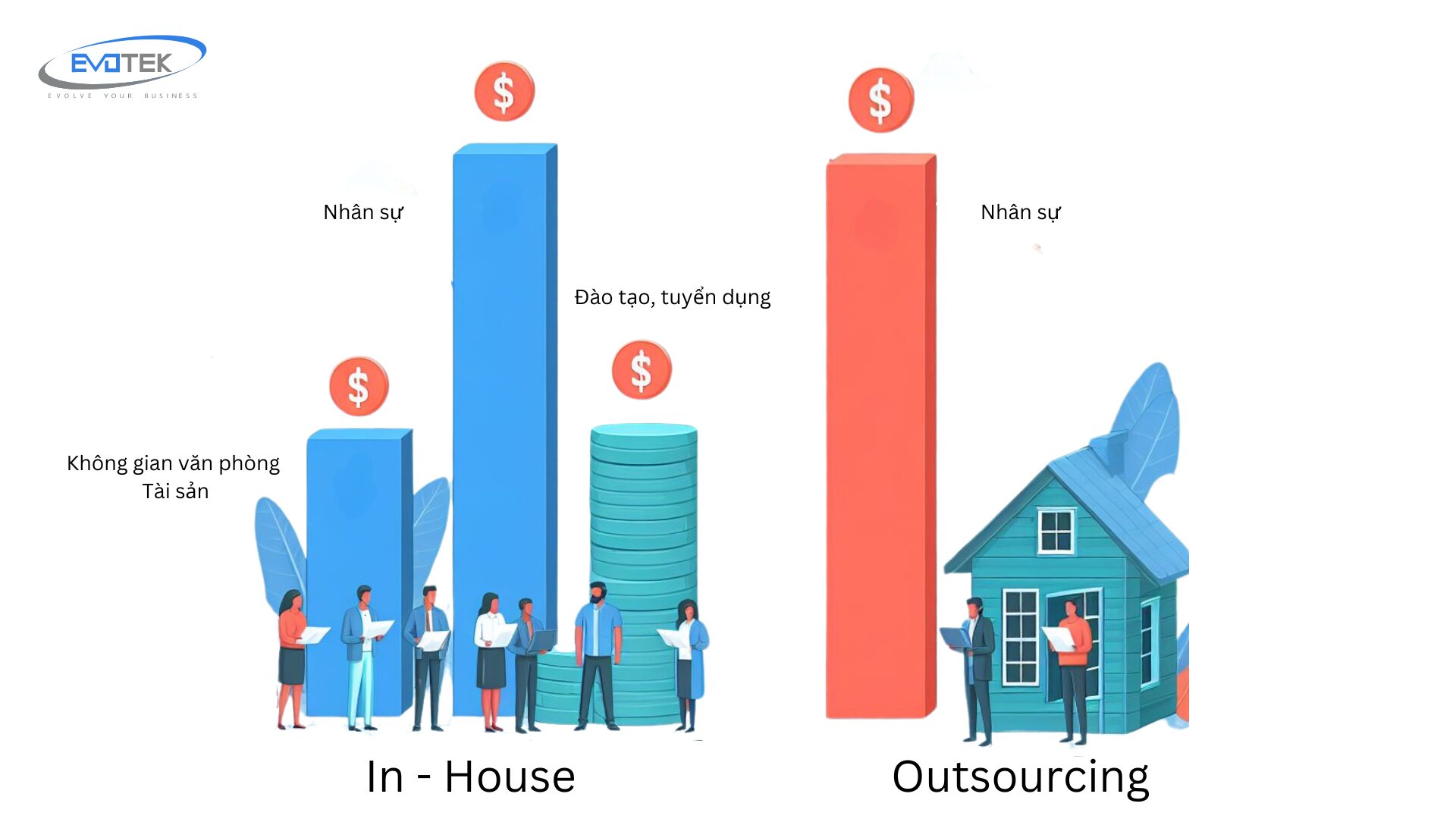The software development outsourcing market has witnessed robust growth in recent years. Despite ongoing uncertainties stemming from the pandemic, forecasts indicate a steady annual growth rate of approximately 5% in the IT outsourcing market over the next four years. This upward trajectory has prompted an increasing number of businesses to explore assistance from firms offering software outsourcing services. However, certain misconceptions surrounding outsourcing continue to dissuade other companies from harnessing the benefits available in the global market.
1. Does outsourcing mean low quality?
Myth: There is a common misconception that high-quality services always come at a high price. Consequently, when presented with quality services at affordable rates, skepticism arises, leading to doubts about the reliability of such offerings.
In reality, the lower costs associated with outsourcing can be attributed to income disparities between countries. For instance, while the average salary of IT professionals in the US stands at approximately $113,639, in Europe, this figure can plummet to as low as $34,006. Thus, outsourcing not only proves to be cost-effective but also facilitates access to skilled programmers, owing to the high-quality and accessible education systems prevalent in many outsourcing destinations.
The practices adopted by renowned technology giants like Google, Facebook, and Apple serve as compelling evidence of the true value outsourcing can deliver. These industry leaders recognized the potential of outsourcing early on and have reaped substantial profits as a result. Their experience is the clearest proof of the true value that outsourcing can bring.
2. Outsourcing Is More Expensive Than an In-House Team
Myth: Hiring an outside software development team for your project is expensive and will deplete the company’s capital.
Fact: Contrary to popular belief, recent trends indicate that businesses are increasingly turning to software outsourcing as a means to reduce costs. According to a 2022 Deloitte survey, 76% of company management cited cost reduction as the primary reason for engaging with external software developers, thereby enhancing flexibility and agility in business operations.
Furthermore, internal staffing costs often surpass those associated with outsourcing due to expenses such as insurance, training, recruitment, and infrastructure development. Additionally, internal staff are typically compensated based on time spent in the office, a model that has proven to be inefficient. In contrast, the time and material outsourcing model ensures a direct correlation between investment costs and outcomes.
Hence, outsourcing not only avoids cost escalation but also enables businesses to save on various expenses while benefiting from favorable tax policies. This approach effectively alleviates financial burdens for businesses.

Learn more about software outsourcing costs. Compare the cost of developing an internal team and an outsourced team.
3. Loss of Project Control
Myth: Outsourcing is essentially handing over complete control of the project to a third party.
Fact: Outsourcing is often misunderstood as relinquishing complete control of a project to a third party. However, there are various outsourcing models available, each offering different levels of customer responsibility and involvement. Reputable companies will not abandon projects and leave customers to bear the consequences, regardless of the outsourcing model chosen.
For those seeking deep involvement in the project, the Staff Augmentation model may be suitable. Under this model, external experts are hired to support the existing team, allowing the customer to retain resource and decision-making control.
Alternatively, the Project model is an option for those wishing to eliminate human resource management responsibilities entirely. This model requires significant trust in the contractor, as they are entrusted with project management and implementation.
For a balanced approach, the Dedicated Team model allows customers to be freed from excessive workload while still participating in the development process and decision-making alongside the contractor. This model promotes shared responsibility between the customer and supplier.
Therefore, clients have the flexibility to choose the most appropriate model to safeguard their rights and ensure project quality. Outsourcing does not equate to relinquishing complete control of the project.
4. Time zone difference affects effective management
Myth: Software outsourcing development companies have offices abroad, with time zone differences, making effective management almost impossible.
Fact: While time zone differences may pose challenges in scheduling meetings, they do not hinder effective communication. Professional software development companies establish clear and concise communication channels to keep all stakeholders informed. Various collaboration technologies and support tools, such as Google Workspace, Jira, Miro, and Slack, facilitate seamless communication.
Moreover, many businesses adopt Agile and Scrum principles, promoting transparency and continuous reporting throughout the work process. Statistics show that up to 71% of US businesses utilize Agile methodologies.
Geographically diverse teams offer numerous advantages, including fresh perspectives, diverse experiences, and new opportunities. Concerns about cultural differences are addressed by most IT companies, which uphold global workplace standards, including principles of professional and ethical conduct.
At Evotek, we have demonstrated the effectiveness of managing geographically diverse teams. Over the past five years, we have successfully collaborated with numerous countries across Europe, America, Japan, Korea, South East Asia on custom software development projects.
5. Outsourcing service providers can compromise your project security
Myth: Entrusting a foreign software company with access to confidential trade information is often perceived as risky.

Fact
- Strict Confidentiality Agreements: Reputable outsourcing companies prioritize the protection of intellectual property rights and confidential information by signing rigorous confidentiality agreements. Breaching such agreements can lead to legal consequences for the service provider.
- Secure Data Storage: Source code and project data are typically stored on separate servers with limited access, restricted to individuals directly involved in the project.
- Employee Monitoring: Reputable companies conduct regular testing and monitoring of employees to ensure adherence to security protocols. Violations may result in disciplinary actions, including dismissal.
- Outsourcing to companies with ISO 27001 certified helps reduce the risk of information breaches
By selecting the right partner and implementing appropriate security measures, outsourcing proves to be a viable option with manageable risks.
6. Software Development Outsourcing Is Only for Giants
Myth: Software outsourcing is only for large businesses
Fact: According to Clutch’s 2023 survey, 83% of small businesses with fewer than 100 employees utilized outsourcing services, highlighting its accessibility beyond large corporations.
Notable startups like Shopify, Airbnb, Uber, and Dropbox began as small ventures and leveraged outsourcing to facilitate growth, underscoring its applicability to startups as well.
While the motivations for outsourcing may vary between large and small companies—cost reduction for large enterprises versus efficiency improvement for small businesses— the overarching benefits outweigh the associated risks.
Software outsourcing has become a prevalent practice across businesses of all sizes, dispelling the notion that it is solely reserved for industry giants.

 日本語
日本語 한국어
한국어 Tiếng Việt
Tiếng Việt 简体中文
简体中文